Newspapers are incredibly valuable for genealogical research. They help put the flesh on the bones of our ancestors. Through newspapers we gain a little insight into the times in which our ancestors lived. Newspapers can also help find the story of your emigrant ancestors. Many are full of information on ship arrivals and departures, what life was like on board the ship, tragedies at sea and messages back to their homelands from those who left.
Illustration 1 1
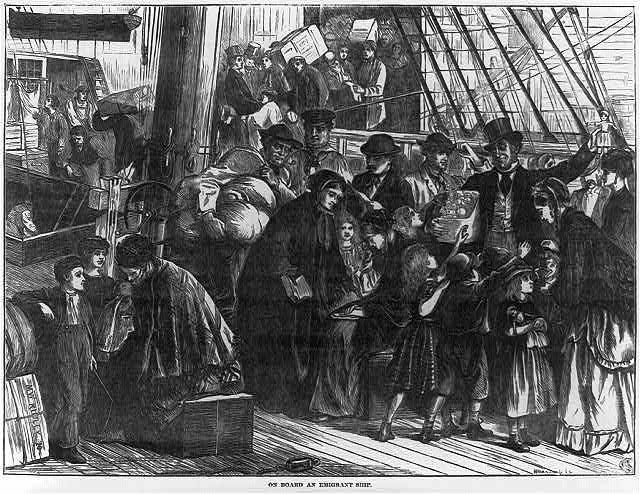
From the advertisements seeking those willing to leave their home for a foreign land, to the letters sent back to those homes from those emigrants, newspapers can add great context to your emigrant ancestors’ journey.
Advertisements for free emigration
Newspapers were full of advertisements offering free or assisted emigration to countries like Australia, New Zealand, Canada, and South Africa. High in demand were those skilled in a trade such as blacksmiths, carpenters, bakers, and bricklayers. Women were also in demand as housemaids, nurses and dairy maids. 2
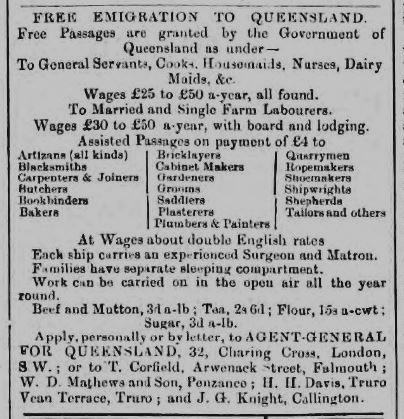
Life Aboard Ship
Newspapers often contained reports on life aboard ship. Most described the awful conditions, the disease and deaths, the lack of food and water and the ill-treatment of the emigrants by the crew. Yet, emigrant’s kept making the journey, hoping that life in a foreign country would be better than where they were previously. These articles describe the deplorable conditions on many ships, but they also contain clues for further research. The article below contains the ship name, the port it arrived in and the date it arrived, where it departed from, the number of days at sea and the number of passengers aboard when it left Liverpool. It also gives the number of passengers who died on the voyage and the number of babies born. 3
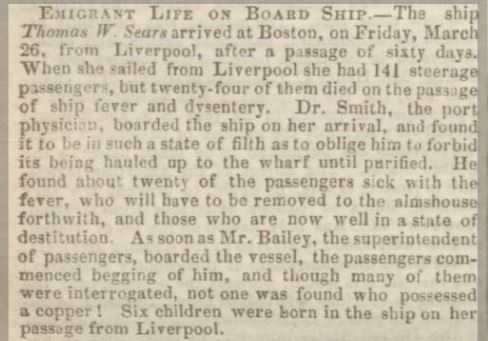
Ships lost at sea or plagued by disease
Traveling by sea was often perilous. Ships sometimes caught on fire and sank, some were damaged by storms, others ran aground on reefs or sand bars. Newspapers carried the stories of survivors, if there were any, or simply reported that the ship was considered late to its port and therefore ‘lost’.
The loss of 20 lives aboard the English emigrant ship, the Trusty, was reported by the Norfolk News (England) on 14 August 1852.4 The ship had left Scarborough, in North England, with 200 emigrants on board. Their final destination was Quebec. The ship had sighted land when a dense fog occurred and the ship struck a reef and began to sink. A boat was lowered and 20 persons climbed aboard and tried to get to shore. Sadly, the boat capsized in rough surf and all drowned. Their names appear in the newspaper article. The remaining emigrants clung to the sinking wreck for over 8 hours until another vessel was able to pull alongside and rescue them.
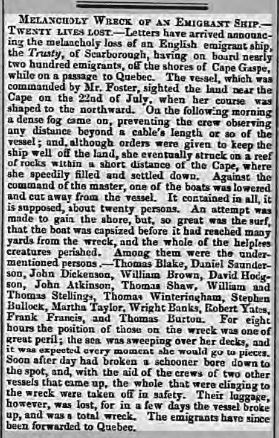
The emigrants aboard the ship, Hartha, left Hamburg, Germany in October 1865, bound for New York. Three months later, in January 1866, the Buckingham Advertiser and Free Press noted the arrival of the ship at Spithead, on the southern English coast. The journey from Hamburg to New York should have taken about a month, instead the emigrants had now been on board the ship for two and half months, arriving on the coast of England instead of New York. Their journey had been fraught with problems from a leak which caused the ship to head for the coast of Scotland for repair, to the discovery of small pox among the passengers. On 20 December 1865, sixteen passengers suffering from small pox were left behind in Scotland while the ship sailed on. In the English Channel, a ferocious storm with gale force winds, forced the ship back to Spithead again. Once more, small pox broke out, this time affecting many more of the emigrants. The Captain was forced to move all the sick off the ship and have it fumigated. Many of the children aboard also suffered from diphtheria. The newspaper noted, “The misfortunes this ship has encountered have dispirited the intended emigrants, as might naturally be supposed.” 5
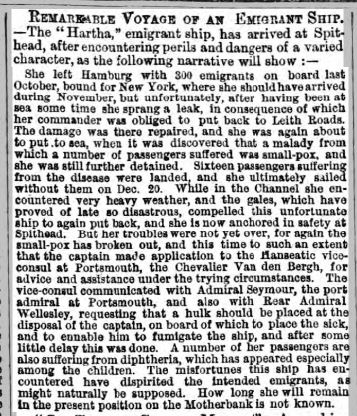
These are the stories that add color to our ancestors’ lives and make them more than just names and dates on a piece of paper. Whether mentioned by name or not, reading these accounts allows us to understand more fully what our ancestors went through in their journey to their new home.
Letters sent back home
Once our ancestors reached their new home, they would send letters back to family left behind. Letters would often be sent to the vicar of the local parish where the emigrants had once resided, and the vicar would request that the newspaper publish the letter so all in the parish could hear how the family was doing.
William and Mary Anne Randle wrote the following letter to their children in Coventry, England, from Quebec, Canada, in 1862.6 The letter is filled with information on their journey to Quebec and their new life there. If William and Mary Anne Randle were your ancestor’s, how fortunate you would be to find all this information! However, if your emigrant ancestor’s followed the same route as the Randle’s, you now have an idea of what that journey entailed and what life was like for new emigrants.
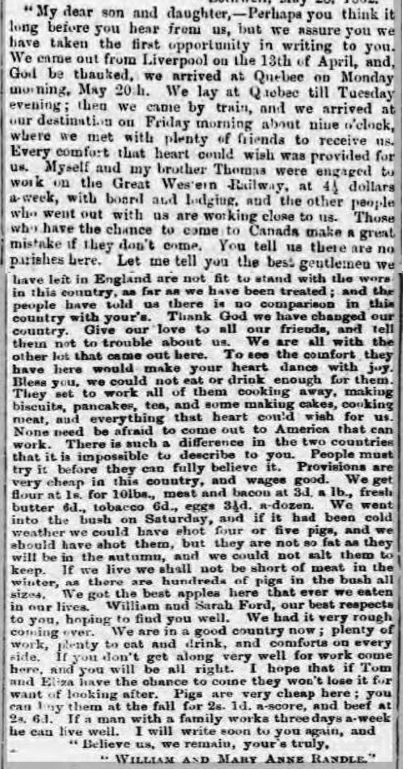
Newspapers are wonderful for filling in the details of the journey our emigrant ancestors’ took to get to their new homelands. From the advertisements ‘selling’ the idea of emigrating, to the letters sent back home, we can add context and color to their lives.
All images are from the British Newspapers Archive and used under their terms of conditions which state that the image appear with a copyright statement and attribution to British Newspaper Archive.
- Illustration 1 “On Board an Emigrant Ship,” Every Saturday: An Illustrated Weekly Journal, Vol. III, 30 December 1871, p. 628; Hathitrust (https://babel.hathitrust.org : accessed 26 September 2018). ↩
- “Free Emigration to Queensland,”The Cornish Telegraph (Penzance, Cornwall), 28 March 1876, Vol. XXV, No. 1318, p. 2, col. 3; British Newspaper Archive (https://www.britishnewspaperarchive.co.uk : accessed 27 September 2018). ↩
- “Emigrant Life On Board Ship,” Manchester Courier and Lancashire General Advertiser, 28 April 1847, Vol. XXIII, No. 1238, p. 270, col. 1; British Newspaper Archive (https://www.britishnewspaperarchive.co.uk : accessed 27 September 2018). ↩
- “Melancholy Wreck of an Emigrant Ship,” Norfolk News, 14 August 1852, No. 398, p. 4, col. 4; British Newspaper Archive (https://www.britishnewspaperarchive.co.uk : accessed 27 September 2018). ↩
- “Remarkable Voyage of an Emigrant Ship,” Buckingham Advertiser and Free Press, 27 January 1866, p. 3, col. 4; British Newspaper Archive (https://www.britishnewspaperarchive.co.uk : accessed 27 September 2018). ↩
- “Letters from Emigrants,” Coventry Herald and Observer, 5 July 1862, p. 3, col. 4 & 5; British Newspaper Archive (https://www.britishnewspaperarchive.co.uk : accessed 28 September 2018). ↩


I have included your blog in INTERESTING BLOGS in FRIDAY FOSSICKING at
https://thatmomentintime-crissouli.blogspot.com/2018/10/friday-fossicking-5th-oct-2018.html
Thank you, Chris
Couldn’t agree more about the value of newspapers… I’d be lost without our TROVE.
LikeLiked by 1 person
Much appreciated, Chris!
LikeLiked by 1 person
You’re welcome…
LikeLike
Thanks for sharing! I love using the local newspapers to fill in the gaps for some of my ancestors. I have found a couple articles about the ships that my ancestors traveled on, but I’m inspired to dig a little further! I also didn’t know about the published letters that were sent back home. Was that a common practice in all of Europe or just certain areas?
LikeLiked by 1 person
Hi EvaAnne! I’m not sure how common the practice was. I’ve mostly seen letters from new immigrants in the US, Australia and South Africa sent back to their English, Irish and Scottish home parishes. I’ll do some digging and see if I can find anything for other parts of Europe. Thanks so much for your comment!
LikeLiked by 1 person
Thanks for this post. I’ve used newspapers a lot in the past, particularly for following court cases, but I hadn’t thought of using them for my emigrant ancestors. So I shall add this to the ‘to-do’ list!
LikeLiked by 1 person
Newspapers are wonderful for court cases! I followed one about a contested will went on for years! I’m sure the gentleman who died had no idea he would cause so much controversy, or maybe he did, knowing the character of his sons!
LikeLiked by 1 person
Fascinating aren’t they? I found two distant uncles who were convicted of sheep stealing and were transported to Bermuda. And my 3x great grandmother was imprisoned twice for theft. I’ve written blog posts about them. x
LikeLiked by 1 person
Newspapers have really helped fill out my ancestors’ stories. I would not have know about the political battle going on in Portugal over allowing mainland Portuguese to emigrate to Hawaii had it not been for a newspaper article.
Mostly, the emigrants had been from the Azores and Madeira Islands. But, in 1882, the first ship went to the Azores and then on to Portugal to pick up the first mainland Portuguese.
Turns out that that was the ship my great great grandmother and her children were on. They got on the ship at Sao Miguel Island. Then, when they got to Lisbon, they had to sit at port for two weeks as the different factions fought over allowing the other Portuguese passengers their leave.
It’s an important part of her story. I can only imagine her anxiety as they waited for permission to leave.
You mentioned some things I did not know about. I didn’t know they would publish letters back home in the local newspaper. Great resource!
LikeLiked by 1 person
You uncovered a really wonderful story about your great great grandmother! I can’t imagine how it must have felt to wait for 2 weeks to find out your fate! Newspapers are so valuable for filling in those details that really help us understand their lives so much more!
LikeLike